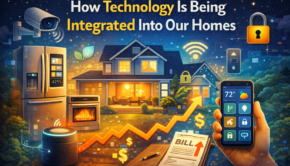How Technology Is Changing the Real Estate Industry
From visiting a virtual reality version of a home for sale to using apps to instantly assess a home’s value and check your credit score, technology continues to transform how people buy and sell homes. And once they are settled into their homes, automation systems can be used to record the random person ringing your doorbell at 3 a.m., turn the thermostat up to a toasty 70 degrees an hour before you wake and turn your lights on and off from afar. How else is technology transforming the real estate industry?
Image Source: Pixabay
High-Tech Buying and Selling
Home prices have rebounded from the housing market crash of 2008. Nationwide, home prices rose 3.6% between July 2018, and July 2019, with the largest jump in prices in South Dakota, Utah and Maine.
Today, 93% of homebuyers use a website to search for a home and 3% explore options on a mobile device or app, according to the National Association of Realtors. For decades, consumers have been able to use the internet to search for the perfect home, complete with the right number of bedrooms and bathrooms and in the ideal neighborhood. But today, new technology has ramped up how a house can be viewed, taking the galleries of dozens of photos to the next level.
Homebuyers can get an aerial view of the neighborhood through drone footage and 3-D online views of houses can help buyers get a better sense of the space. Virtual reality headsets can up the game, allowing potential buyers to feel like they are walking through a property, which is particularly useful for when it is still under construction.
Some programs, such as one called roOomy, pair with virtual reality to help buyers visualize a home with furniture and decor that’s similar to their own. With more than 100,000 items to choose from, users can look at a 3D photo of a room and decorate it to their taste. Using virtual reality, they can then step into the room to get a feel for it.
Realtors can even call in the robots to help them sell. A few realty companies are using robots at busy open houses to answer questions and take information, while others are employing them to let potential buyers, renters or home inspectors into a property using a special code and then showing them around when an agent can’t be there. The agent can be linked in to answer questions and get paperwork going. Some robots are being used for more mundane, time-consuming jobs like shooting video.
Technology is also changing every part of economic development, from deciding where new houses will go, to how those houses are built. 3D printing is not just creating models but may soon make entire buildings. Virtual reality can help builders and architects visualize how they will construct new structures.
UK-based We Buy Any House experts Property Solvers, for example, have been integrating 3D online virtual tours for their clients in response to social distancing and lockdown restrictions resulting from COVID-19.
Apps That Make it Easier
But technology used in real estate can also be more accessible for everyday users than virtual reality or robots. A growing wealth of apps helps navigate buying and selling. Some real estate agents are creating their own apps, making it easier for buyers to see their listings and schedule showings.
Many websites also have apps that make it quicker to search for a home on the go. These include Trulia, Redfin, Zillow, Realtor.com, Homesnap and others, which have varying capabilities such as offering listings, home value history, maps and connections with real estate agents.
On the financial side, apps like Credit Karma allow buyers to see their credit scores for free, while others make calculating mortgage payments a snap. Quicken, Zillow and dozens of others available free of charge. Numerous apps also make it easier to connect with a home inspector who will check out everything from the roof to the wiring to make sure it’s in good shape and up to code. They can also help potential homeowners research insurance costs and home warranties. Insurance is a necessary expense, while home warranties can often be negotiated into selling prices. These handy contracts can take some of the guesswork out of how long an appliance or system will last and will repair or replace them.
Home Automation
Just as technology has changed how to buy a house, it’s also transforming life at home using smart plugs and power strips that connect appliances to WiFi. You can control devices connected to the internet, from window blinds to hot water heaters, from your phone or another device. If they are connected to voice assistants like Amazon’s Echo, you can speak a command, such as, “Turn on the lights in the dining room,” and your room will illuminate.
Safety is another benefit of home automation. Video surveillance cameras can alert you to movement inside or outside your home. Cameras at your front door can let you know if it’s safe to open the door or if someone is stealing a package left on the front steps. Use lighting you control from your phone to turn lights on and off in various parts of your home making it appear someone is there. Smart locks can be used to control opening the front door remotely.
As we move through the 2020s, additional technology will come online that makes buying a home easier and living in it simpler and more connected.

















